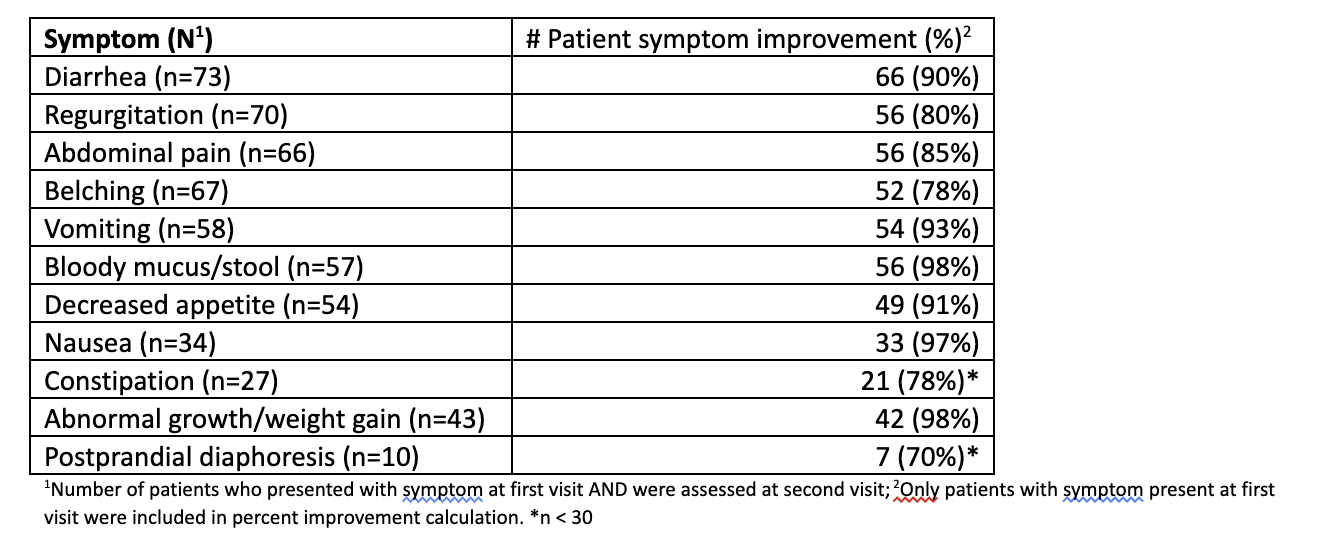Pediatric Nutrition
Category: Abstract Submission
Pediatric Nutrition I
245 - Amino Acid Formula Improves Gastrointestinal Symptoms in Infants with Suspected CMPA: A Prospective Cohort Analysis
Friday, April 22, 2022
6:15 PM - 8:45 PM US MT
Poster Number: 245
Publication Number: 245.141
Publication Number: 245.141
Michael J. Wilsey, USF Health Morsani College of Medicine, St. Petersburg, FL, United States; Lea V. Oliveros, Johns Hopkins All Children's Hospital, Saint Petersburg, FL, United States; Kathryn M. Kimsey, Johns Hopkins All Children's Hospital, Tampa, FL, United States; Grafton S. Barnett, Johns Hopkins All Children's Hospital, Harvest, AL, United States; Jerry M. Brown, Johns Hopkins All Children's Hospital, New port Richey, FL, United States

Jerry M. Brown, II
Student Researcher
Johns Hopkins All Children's Hospital
New port Richey, Florida, United States
Presenting Author(s)
Background: Cow’s milk protein allergy (CMPA) occurs in 2-3% in infants. Long-term efficacy of amino acid formulas (AAF) in treating CPMA is well established. Parents and healthcare providers (HCP) prioritize rapid reduction of CMPA symptoms in the short-term as the main treatment goal.
Objective: Data regarding short-term efficacy of treating infants with CMPA with AAF is limited. We sought to determine the short-term efficacy of gastrointestinal (GI) symptom relief in infants < 6 months of age with CMPA treated with AAF.
Design/Methods: This is a prospective cohort analysis of de-identified survey data obtained from healthcare providers (HCP) treating 107 patients < 6 months of age with symptoms suggestive of CMPA. Demographic data and baseline symptoms were collected via ZS Moments, a mobile app on an electronic device, by HCP. GI symptoms scored by severity from 0 to 3 (none, low, moderate, severe) at the first visit and were then started on an amino acid formula. Patients were reevaluated at follow-up to assess for changes in symptom severity and symptoms scoring was repeated. Patients who discontinued or switched treatments were included in the overall sample but excluded from symptom analysis. Only patients with a given symptom at the first visit were included in percentage calculations.
Results: Results are summarized in Table 1. Most HCP's (87%) involved in the survey were general pediatricians. Of 105 patients identified, 102 (97%) were included for symptom analysis. 55% were male and 50% had a family history of atopy. Most (~3/4) were newly diagnosed with CMPA, the majority (93%) were diagnosed by clinical assessment, and ~2/3 were seen in follow-up within 3 to 5 weeks. Symptom improvement was consistent across different follow-up visit durations between visit 1 and 2. The most common symptoms were diarrhea (n=73; 58%), regurgitation (n=70; 70%), belching (n=67, 52%), and abdominal pain (n=66, 58%). Of those with GI symptoms at visit 1, 93% (n=193) improved at visit 2.Conclusion(s): This is the largest prospective survey examining short-term efficacy of GI symptom reduction using AAF in infants < 6 months with CMPA. Analysis of this prospective cohort showed significant improvement in GI symptoms of CMPA in infants under 6 months of age when treated with amino acid formula. AAF appears to provide clinical relief and rapid reduction of GI symptoms in infants < 6 months of age with suspected CMPA, often by the next follow-up visit.
Percentage of Patients Reporting Improvement of GI Symptoms at Visit 2
Objective: Data regarding short-term efficacy of treating infants with CMPA with AAF is limited. We sought to determine the short-term efficacy of gastrointestinal (GI) symptom relief in infants < 6 months of age with CMPA treated with AAF.
Design/Methods: This is a prospective cohort analysis of de-identified survey data obtained from healthcare providers (HCP) treating 107 patients < 6 months of age with symptoms suggestive of CMPA. Demographic data and baseline symptoms were collected via ZS Moments, a mobile app on an electronic device, by HCP. GI symptoms scored by severity from 0 to 3 (none, low, moderate, severe) at the first visit and were then started on an amino acid formula. Patients were reevaluated at follow-up to assess for changes in symptom severity and symptoms scoring was repeated. Patients who discontinued or switched treatments were included in the overall sample but excluded from symptom analysis. Only patients with a given symptom at the first visit were included in percentage calculations.
Results: Results are summarized in Table 1. Most HCP's (87%) involved in the survey were general pediatricians. Of 105 patients identified, 102 (97%) were included for symptom analysis. 55% were male and 50% had a family history of atopy. Most (~3/4) were newly diagnosed with CMPA, the majority (93%) were diagnosed by clinical assessment, and ~2/3 were seen in follow-up within 3 to 5 weeks. Symptom improvement was consistent across different follow-up visit durations between visit 1 and 2. The most common symptoms were diarrhea (n=73; 58%), regurgitation (n=70; 70%), belching (n=67, 52%), and abdominal pain (n=66, 58%). Of those with GI symptoms at visit 1, 93% (n=193) improved at visit 2.Conclusion(s): This is the largest prospective survey examining short-term efficacy of GI symptom reduction using AAF in infants < 6 months with CMPA. Analysis of this prospective cohort showed significant improvement in GI symptoms of CMPA in infants under 6 months of age when treated with amino acid formula. AAF appears to provide clinical relief and rapid reduction of GI symptoms in infants < 6 months of age with suspected CMPA, often by the next follow-up visit.
Percentage of Patients Reporting Improvement of GI Symptoms at Visit 2

